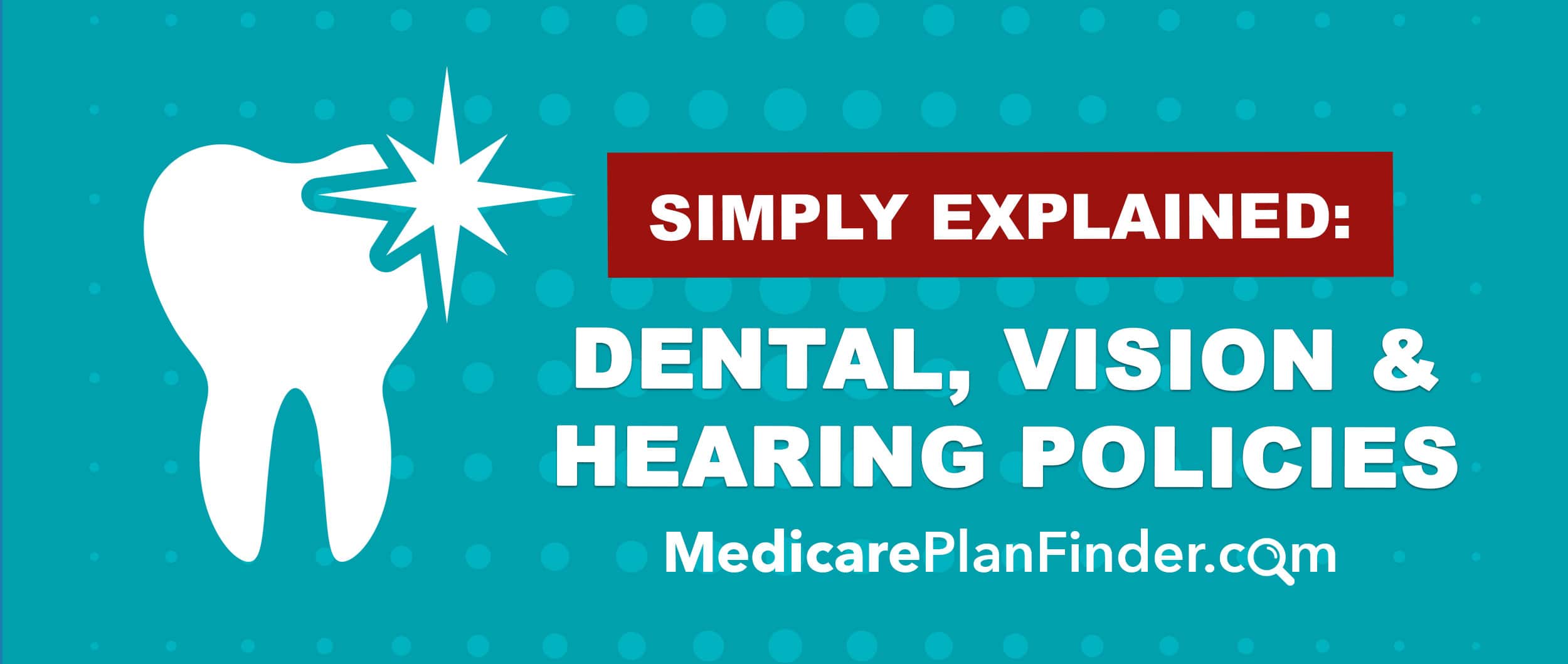
Dental Vision Hearing Insurance for Seniors and Medicare Beneficiaries
November 26, 2019It’s important to always be mindful of your overall health. That includes everything – from the aches and pains you feel to your teeth and your eyesight!
Unfortunately, Original Medicare does not include extensive dental, vision, and hearing insurance for seniors and Medicare beneficiaries. If you are looking for dental, vision, and hearing insurance, you should consider a Medicare Advantage plan.
Original Medicare only includes Part A (hospital coverage) and Part B (doctor coverage), but Medicare Advantage plans, also called Part C, generally include dental benefits, vision benefits, hearing benefits, prescription drug coverage, and more!

Original Medicare covers limited dental, vision, and hearing procedures:
- Oral examinations as part of another hospital stay
- A jaw disease, oral cancer, face tumor, or face fracture-related procedure
- Infections caused by dental procedures
- Severe and medically necessary eye procedures and tests such as cataract surgery and corrective lenses following surgery
- Macular Degeneration, Glaucoma, and Diabetic Retinopathy tests
- Hearing tests that are a part of your primary physician’s routine well-visit
- Cochlear implants
Does Medicare pay for hearing aids?

Original Medicare does not cover everything. Medicare Advantage plans can add the following hearing insurance for seniors benefits:
- Treatments for hearing problems
- Hearing aids
- Hearing aid fittings
- Hearing aid exams
- Hearing tests
Hearing Aid Costs
Medicare Advantage health insurance plans can help cover hearing aid costs associated with fittings, exams, and tests.
Hearing aid costs can range anywhere from $400 to $4,000 per ear. Even if the initial device isn’t too expensive, you may have to pay the costs of a hearing aid fitting, hearing aid exams, and replacement hearing aids every five years or so.
When you add everything together, you could be paying thousands of dollars over your lifetime for your ear care. Luckily, a Medicare Advantage plan is a solution that may help you out financially.
Hearing Aid Brands
When choosing hearing aid brands, details matter! Have an idea of your budget, your ear size, and how you will be using the hearing aid. Will you wear it all day long? Can you afford to splurge a little on your hearing aid?
Some of the most highly-rated hearing aid brands are Phonal, Unitron, Signia, Sonic, and Widex – but be careful! Not all Medicare Advantage plans will cover all hearing aid brands. Be sure to carefully look at the provider network before you select a plan to make sure that hearing aid brands you like are included. Some insurance companies may also give recommendations.
Hearing Aid Types
Just like there are numerous hearing aid brands, there are also numerous hearing aid types. Some of the most common hearing aid types are as follows:
- Invisible-In-the-Canal (IIC)
- Custom-fitted to your ear canal
- Invisible when worn
- Great for mild to moderate hearing loss
- Completely-In-Canal (CIC)
- Custom-fitted to your ear canal
- In-The-Canal (ITC)
- Custom-made to fit in your ear canal with small portion showing outside of the ear
- Great for mild to mildly severe hearing loss
- In-The-Ear (ITE)
- Custom-made to fit outer portion of your ear
- Great for mild to severe hearing loss
- Receiver-In-Canal (RIC)
- Barely seen when worn
- Uses electrical wires instead of a plastic tube
- Great for mild to moderate hearing loss
- Behind-The-Ear (BTE)
- Housed in casing behind the ear
- Tube directs sound into earmold fitted inside the ear canal
- Great for moderate to severe hearing loss
Medicare Dental Coverage

Original Medicare doesn’t cover everything. Medicare Advantage plans can add the following dental insurance for seniors:
- Dental issues caused by another procedure, such as for jaw disease or a kidney transplant
- Dentures and denture care
- Fillings and extractions
- Routine checkups
Does Medicare pay for dentures?
If denture or dental implant coverage is important you, then you should consider a Medicare Advantage plan as dental insurance for seniors.
Medicare Advantage (MA) plans provide Part A (hospital coverage) and Part B (medical coverage) plus additional coverage like prescription drugs, vision, hearing, and dental health!
Most Medicare Advantage dental plans cover dentures and much more — cleanings, x-rays, annual exams, fillings, pullings, and root canals.
Supplemental Dental Insurance for Seniors on Medicare
Seniors and Medicare eligibles may not find the oral health coverage they need with Medicare Advantage or Medicare Supplement plans. For example, a Medicare Advantage plan might cover routine dental services (like preventive care), but not major services like dental implants.
Medicare Supplements (Medigap) are private plans that cover financial items like Original Medicare copays and coinsurance. With a Medicare Supplement plan, you pay a monthly premium and you don’t pay a separate copay or coinsurance when you visit the doctor*.
You cannot have both a Medicare Advantage and a Medicare Supplement plan at the same time. It’s important to know how each type of plan can save you money. Contact your agent to discuss the difference between each type of plan, and ask how you can save money with each. Talk to your agent about your dental care needs, too. Your agent may be able to find a plan in your area that meets your budget needs along with your medical needs.
If you need additional coverage, you may be able to find private dental insurance plans that cover items such as dental implants, cosmetic dentistry, or orthodontics. Private dental plans, like Medicare Advantage plans, may be available as a dental PPO, HMO, or other plan type.
*Plan benefits can vary by plan. Some Medicare Supplements cover copays for doctor’s appointments. Medicare Supplements only help cover Medicare-approved charges.
Dental Discount Plans
Instead of a dental insurance plan, you may be able to find a dental discount plan in your area. With a dental discount plan, you’ll pay an annual fee upfront (instead of a monthly premium). You won’t have copayments, but you’ll have discounted rates on your dental services (if you see a network dentist). You would pay the dentist directly. Talk to your agent about discount plan options.
Medicare Vision Coverage
Original Medicare does not cover everything. Medicare Advantage plans can add the following vision benefits:
- Routine eye checkups
- Eye exams
- Glasses
- Contacts
Medicare Eyeglasses Providers
Each Medicare Advantage plan will have its own provider network. That means that not all Medicare eyeglasses providers will accept the plan you choose.
When shopping for a Medicare Advantage plan, you should always look at the provider network and make sure that your favorite doctor or other vision provider accepts the plan you choose.
Medicare Advantage PPO
There are several different types of Medicare Advantage plans. If you’re looking for dental, vision, or hearing insurance for seniors a Medicare Advantage PPO plan is a good way to go. PPOs are one of the most popular types of Medicare Advantage plans.
A Medicare Advantage PPO is ideal because even though there are doctor and pharmacy networks, you can go to other doctors and pharmacies. You may not have as much coverage with out-of-network doctors and pharmacies, but at least you have that option.
You do not need to select one primary care doctor and usually do not need referrals, meaning that if you need to go to a vision specialist, you can technically go to any provider.
Medicare Advantage plans are convenient because all the coverage you need can be rolled into one plan with one monthly premium. Some MA plans even offer low deductibles in exchange for high premiums!
Enroll in Medicare
Are you interested in getting dental, vision and hearing insurance for seniors? A Medicare Advantage plan may be the perfect solution!
Our agents with Medicare Plan Finder can answer any questions you may have and may be able to help you find the best plan for your needs and budget.
If you’re interested in arranging a no-cost, no-obligation appointment, fill out this form or call us at 833-567-3163.

*This post was originally published on March 16, 2017, by Anastasia Iliou. The latest update was on November 26, 2019, by Troy Frink.

